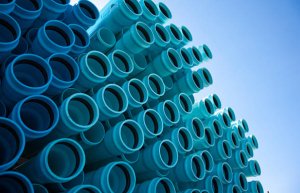Introduction: The Importance of Ground Calcium Carbonate in the Plastic Industry
In the vast and varied world of industry, numerous materials play crucial roles in the creation and composition of the products we use every day. Among them, Ground Calcium Carbonate (GCC) emerges as a vital player, especially in the plastic industry.
GCC, a naturally occurring substance, is not only cost-effective but also offers a diverse range of beneficial properties that make it indispensable to the plastic industry. The importance of Ground Calcium Carbonate lies in its ability to enhance the performance of plastic products while simultaneously reducing production costs.

Ground Calcium Carbonate acts as a functional filler in plastic production, contributing to its dimensional stability, enhancing its processing characteristics, and improving the product's surface finish. It is a versatile substance, used in various plastic applications, from PVC applications to PE film, and from rigid pipes and fittings to flexible sealants.
GCC's attribute of being less abrasive than other mineral fillers is a boon to the machinery, as it reduces wear and tear, prolonging the machinery's lifespan. It also yields whiteness to plastic, negating the need for expensive white pigments. Notably, the use of Ground Calcium Carbonate can also increase the plastic's overall stiffness, allowing less plastic to be used without compromising the product's quality or durability.
In an era where sustainability and cost reduction are pivotal, the inclusion of Ground Calcium Carbonate in the plastic industry exemplifies a move towards more efficient, cost-effective, and environmentally friendly production processes.
In a nutshell, Ground Calcium Carbonate is not just a filler, but a value-adding component in the plastic industry, playing a significant role in enhancing product performance, reduction in production costs, and contributing to environmental sustainability. Its importance cannot be overstated, and it will continue to be a key player in the plastic industry for the foreseeable future.
In today's technologically driven world, the importance of high-performance materials cannot be overstated. Plastics, in particular, play a pivotal role in a wide array of industries, from packaging and automotive to electronics and construction. One of the key elements that significantly enhances the properties and performance of plastic is Ground Calcium Carbonate (GCC).
Ground Calcium Carbonate, a naturally occurring mineral, has emerged as a valuable additive in the plastic industry due to its array of benefits. The incorporation of GCC into plastic materials aids in enhancing their mechanical, thermal, and electrical properties, thereby leading to an improved overall performance of the plastic product.
One of the primary benefits of GCC is its ability to provide a cost-effective means of improving stiffness, a crucial property in many plastic applications. By increasing the stiffness, the overall strength of the plastic is enhanced, allowing it to withstand substantial amounts of stress and strain.
In addition to stiffness, the addition of Ground Calcium Carbonate can also enhance the impact strength of plastics. The mineral acts as a reinforcing filler, imparting greater durability and resistance to the plastic material. This is particularly beneficial in industries where the plastic products are constantly subjected to high-stress conditions, such as automotive and construction.
Moreover, GCC has been found to significantly improve the thermal conductivity of plastics. This is a critical property for plastic products used in electronic and heat-transfer applications. With higher thermal conductivity, these products can effectively dissipate heat, thus reducing the risk of overheating and potential damage.
The use of Ground Calcium Carbonate in plastics also adds to their dimensional stability. This property ensures that the plastic maintains its original size and shape, even when subjected to changes in temperature or humidity. This characteristic is particularly important for plastics used in precision applications, such as in the medical or aerospace industries, where even the slightest alteration can lead to significant operational issues.
In conclusion, Ground Calcium Carbonate serves as a versatile and invaluable additive in the plastic industry, enhancing various properties and performance aspects of plastic materials. Its contribution to the improvement of stiffness, impact strength, thermal conductivity, and dimensional stability makes it an essential component in the manufacturing of high-performance plastics. As the demand for such plastics continues to rise across various industries, the role of GCC in their production is set to become even more significant.
Ground Calcium Carbonate (GCC), an abundant and naturally occurring mineral, has been a game-changer in the plastics industry. Its usage is not only beneficial for enhancing product quality but also contributes significantly to cost reduction in plastic manufacturing. In this section, we delve into the vital role Ground Calcium Carbonate is playing in streamlining the manufacturing process and reducing expenses.
One of the primary ways Ground Calcium Carbonate contributes to cost reduction is by acting as a filler. GCC is considerably cheaper than the polymers used in plastic production. Therefore, replacing a portion of the polymer content with GCC allows manufacturers to produce the same volume of plastic with less expensive material, substantially lowering the overall production cost.
Moreover, the introduction of Ground Calcium Carbonate into the manufacturing process can boost productivity. GCC increases the speed at which the plastic can be extruded or injection molded, thus speeding up the production process. This enhanced efficiency translates into an increased output in less time, significantly reducing labor costs.
Ground Calcium Carbonate also minimizes wear and tear on machinery. GCC is softer than most additives, therefore it is less abrasive and can extend the life of processing equipment, leading to lower maintenance and replacement costs.
From a sustainability perspective, the use of GCC can also reduce the carbon footprint of plastic production. As GCC is naturally occurring, it requires less energy to produce than synthetic fillers, reducing the overall environmental impact of the manufacturing process.
Lastly, the use of Ground Calcium Carbonate in plastic manufacturing does not compromise, and often even enhances, the quality of the end product. GCC improves the plastic's thermal resistance and rigidity, and can lend a glossy finish to the final product, adding value without adding cost.
In summary, Ground Calcium Carbonate is an invaluable asset to the plastics industry. It offers a unique combination of cost reduction, enhanced productivity, machinery preservation, and environmental benefits. The strategic use of GCC in plastic manufacturing can, therefore, contribute significantly to both the bottom line and the sustainability efforts of any company in the sector.
Applications of Ground Calcium Carbonate in Various Types of Plastic Products
Ground Calcium Carbonate (GCC) is an essential mineral that finds extensive utility in a wide range of plastic products. Its inherent properties such as high brightness, low oil absorption, easy availability, and cost-effectiveness make it a preferred choice for many manufacturers. The following section sheds light on the versatile applications of Ground Calcium Carbonate in various types of plastic products.
One of the primary applications of Ground Calcium Carbonate lies in the manufacturing of PVC Pipes. The addition of GCC enhances the rigidity and overall durability of the pipes, making them more resistant to impact and pressure, thereby significantly increasing their lifespan.

GCC also plays a crucial role in the production of cable sheathing. By incorporating Ground Calcium Carbonate into the plastic compound, manufacturers can improve the insulation properties of the cables. This not only enhances the safety and efficacy of the cables but also ensures their longevity.
In the realm of plastic film production, the use of Ground Calcium Carbonate is noteworthy. GCC, when added to plastic films, enhances their opacity and whiteness, making them more suitable for packaging applications where appearance matters. Additionally, the inclusion of GCC in the manufacturing process results in films with improved mechanical properties, such as increased tensile strength and puncture resistance.
Ground Calcium Carbonate is also used extensively in the production of plastic bottles and containers. The incorporation of GCC in the plastic molding process improves the structural integrity of the end products, making them more sturdy and resilient. This is particularly beneficial in the food and beverage industry, where the packaging needs to withstand various environmental and handling stressors.
The application of Ground Calcium Carbonate in the production of automotive components is another area worth mentioning. GCC is used to enhance the overall quality of various plastic parts, such as dashboards, bumpers, and interior components. It not only enhances their physical attributes but also contributes to reducing the overall weight of the vehicle, thereby improving fuel efficiency.
In conclusion, the applications of Ground Calcium Carbonate in various types of plastic products are extensive and varied. Its ability to enhance the physical properties of plastics while also contributing to cost-effectiveness makes it a valuable addition to the plastic manufacturing industry. As the demand for high-quality, durable, and aesthetic plastic products continues to rise, the role of Ground Calcium Carbonate is set to become even more significant.
Comparative Analysis: Ground Calcium Carbonate vs. Other Fillers in Plastic Production
Ground Calcium Carbonate (GCC) has been a cornerstone in plastic production and other industrial applications for many years. For the purpose of this article, we will delve into the comparative analysis of Ground Calcium Carbonate versus other fillers in plastic production, highlighting the unique attributes, cost-effectiveness, and performance of each.
The key role of fillers in plastic manufacturing is to reduce the production cost while improving the performance characteristics of the final product. Fillers contribute significantly to the physical properties of the plastics, including tensile strength, impact resistance, heat distortion temperature, and dimensional stability, among others.
Ground Calcium Carbonate, a naturally occurring substance, is renowned for its multitude of benefits. What sets GCC apart from other fillers is its exceptional brightness, which impacts the overall aesthetic appeal of the plastic product. The particle size and shape of GCC also contribute to a smoother surface finish on the final product. It's worth noting that Ground Calcium Carbonate offers a unique blend of cost reduction and performance enhancement that is quite unparalleled.
On the other hand, popular fillers such as talc, kaolin, and glass fibers each bring their own set of benefits to the table. However, they also come with their respective drawbacks. Talc, for instance, offers higher stiffness and heat resistance but may impact negatively on the impact strength of the final product. Kaolin, while enhancing dimensional stability, can lead to a reduction in tensile strength. Glass fibers provide excellent mechanical strength but can affect the aesthetic appeal of the plastic.
When we consider cost-effectiveness, Ground Calcium Carbonate stands out. Relative to the performance enhancement it provides, its cost is significantly lower than that of most other fillers. This makes it an ideal choice for plastic manufacturers working on a tight budget but unwilling to compromise on quality.
In conclusion, while each filler has its own unique attributes and potential benefits, Ground Calcium Carbonate remains a highly versatile and cost-effective choice. Its unique blend of brightness, smooth finish, and affordability make it a popular choice among manufacturers in the plastic industry. However, the selection of the appropriate filler largely depends on the specific requirements of the plastic product being manufactured. Therefore, it's crucial for manufacturers to conduct a thorough analysis before choosing the filler for their plastic production process.
Ground Calcium Carbonate (GCC) is increasingly positioned at the forefront of sustainable practices within the plastics industry, offering a plethora of environmental and sustainability benefits that cannot be ignored. The incorporation of Ground Calcium Carbonate in plastic production is not only cost-effective but also decreases the industry's ecological footprint.
The primary environmental advantage of incorporating Ground Calcium Carbonate in plastics is the reduction of petroleum-based resin used in the manufacturing process. GCC acts as a filler, replacing a significant portion of resin, which is derived from non-renewable resources. The substitution of resin with GCC thus conserves these resources, contributing to the overall sustainability of the plastic industry.
Moreover, Ground Calcium Carbonate is a naturally occurring mineral, abundant and easily extractable. This makes it a more sustainable choice compared to synthetic fillers that require energy-intensive processes for their manufacture. The extraction and processing of GCC are less harmful to the environment, producing fewer greenhouse emissions compared to the production processes of synthetic counterparts.
Plastics incorporating Ground Calcium Carbonate also offer improved recyclability. GCC-filled plastics can be ground and reprocessed into new products, reducing the amount of plastic waste entering our landfills and oceans. This circular approach to plastic production is a significant step towards achieving a sustainable, zero-waste industry.
The use of Ground Calcium Carbonate in plastics also provides functional benefits that indirectly contribute to sustainability. GCC enhances the rigidity, strength, and heat resistance of plastic products, thereby extending their lifespan and reducing the frequency of replacement. This leads to less overall consumption of plastic goods, further minimizing environmental impact.
Furthermore, Ground Calcium Carbonate is a white mineral that can act as a natural colorant for plastic products, eliminating the need for artificial and potentially harmful dyes. This not only reduces the chemical load on the environment but also promotes health safety as these plastics are less likely to leach harmful chemicals.
In conclusion, the use of Ground Calcium Carbonate in plastics presents a myriad of environmental and sustainability benefits. It exemplifies the role of innovative material solutions in driving the plastics industry towards a more sustainable future. The incorporation of GCC in plastic production is not a mere trend, but a necessity for an industry seeking to align with global sustainability goals.
Challenges and Considerations When Incorporating Ground Calcium Carbonate in Plastics
In the realm of plastics manufacturing, Ground Calcium Carbonate (GCC) holds a significant position due to its multifaceted applications. This mineral, derived from naturally-occurring limestone, is extensively used as a filler to give plastics improved rigidity, dimensional stability, and better heat dispersion. However, the incorporation of Ground Calcium Carbonate into plastics is not without its challenges and considerations, which we will discuss in this article.
One primary challenge is the potential impact of Ground Calcium Carbonate on the durability and strength of the plastic. Although GCC improves rigidity, an excess amount can potentially lead to brittleness, adversely impacting the product's overall strength. Therefore, manufacturers must meticulously balance the GCC content to ensure structural integrity while reaping the benefits of its inclusion.
Particle size of the Ground Calcium Carbonate is another critical consideration. The size of the particles directly influences the plastic's surface finish and overall appearance. Smaller particles result in a smoother finish, while larger particles may cause a rougher texture. Hence, manufacturers need to choose the appropriate particle size based on the desired end-product's characteristics.

The dispersion of Ground Calcium Carbonate within the plastic matrix is a significant challenge as well. Inadequate dispersion can lead to uneven distribution of the filler, causing inconsistencies in the product's properties. Manufacturers often use dispersing agents to improve the distribution of GCC in the plastic matrix, but this adds an extra step to the manufacturing process.
The environmental impact of using Ground Calcium Carbonate also needs careful attention. While GCC is sourced from natural limestone, its extraction and processing can contribute to carbon emissions, water pollution, and habitat destruction. It is essential for manufacturers to source GCC from suppliers that follow sustainable practices to minimize environmental harm.
The cost of incorporating Ground Calcium Carbonate can be a potential drawback too. Although GCC itself is relatively inexpensive, the additional processes required for its incorporation, such as grinding to achieve the desired particle size and the use of dispersing agents, can increase production costs.
In conclusion, incorporating Ground Calcium Carbonate in plastics offers several advantages but also presents a myriad of challenges and considerations. By understanding these complexities, manufacturers can make more informed decisions that balance the benefits of GCC with the potential drawbacks, thereby optimizing product performance, sustainability, and cost-effectiveness.
Conclusion: The Future of Ground Calcium Carbonate in Innovating Plastic Industry Solutions
As we look to the future of the plastic industry, a key player that stands out is Ground Calcium Carbonate (GCC). This versatile mineral compound has already proven its worth in various aspects of the industry, and its potential for future developments is limitless.
Ground Calcium Carbonate is a critical component in the manufacture of plastic products, enhancing their overall functionality and durability. It serves as an economical filler, reducing the overall production costs while improving the product's physical properties. Increasingly, GCC is being recognized not only for its cost-effectiveness but also for the value it adds to the plastic product's performance.
In the future, we anticipate a growing demand for sustainable and environmentally friendly solutions in the plastic industry. Ground Calcium Carbonate, being a naturally occurring mineral, poses minimal environmental impact and can play a vital role in this transition.
Moreover, the potential to utilize Ground Calcium Carbonate in biodegradable plastics presents a promising avenue for research and development. With the escalating global concern over plastic waste, the development of biodegradable plastics using GCC could revolutionize the industry, creating products that not only perform well but also degrade harmlessly over time.
In addition, with the advent of new technologies, the plastic industry is on the brink of unprecedented innovation. Ground Calcium Carbonate, given its inherent properties and versatility, will undoubtedly be a part of this evolution. Advancements in nano-technology, for instance, could enable the development of nano-calcium carbonate with superior properties such as enhanced strength and durability.
In conclusion, the future of Ground Calcium Carbonate in the plastic industry is not only promising but pivotal. Its role in innovating plastic industry solutions is set to expand, with potential applications ranging from sustainable plastics to high-performance nanocomposites. As we move forward, it is clear that Ground Calcium Carbonate will continue to be a cornerstone of innovation in the plastic industry.
